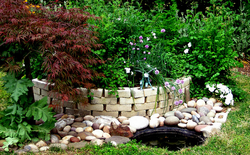Lawns are time- and resource-intensive options for the average gardener. A large lawn will take space where more fertile, productive or edible plants could be growing, while all lawns are prone to weeds, die-off, bug problems and such that have spawned a huge industry of chemical solutions that are not healthy for humans or the environment.
Finding ways to care for a lawn sustainably is therefore an important part of spending less time, money and resources on lawn care.
Ways to achieve sustainable lawn care
Various factors affect sustainability in lawn care:
- Height of the grass: Don't cut too short! Let it grow a little longer to reduce evaporation. it also reduces how often you need to mow. (Remember, what "lazy gardening" is actually efficient gardening.)
- Choice of mower affects energy use as well as pollution (water pollution, air pollution and noise pollution). The best choice for all of these concerns is a reel mower, pushed by human effort. Modern push mowers are easy to push and care for.
- Let the clippings remain on the grass - they will settle down to the soil surface and add organic matter to the soil. Alternatively you can compost it, but never discard it.
- Be organic - with a little forethought, organic care is easy and effective, and you avoid the risks to health and ecology from chemical fertilizers and pesticides.
Consider alternative water sources:
- Greywater reuse (with appropriate greywater treatment, depending on the source and pollutants). Consider directing it into a channel filled with gravel, so it absorbs into the soil, and not directed onto the surface, to avoid people coming in contact with it.
- Rainwater - either storing in a tank, or groundwater recharge through proper soil management (to increase absorption) and contouring (as in swales to allow rainwater to sit and absorb into the soil).
Avoid using pesticides, fungicides or insecticides on the lawn. Your children and pets play on the lawn and everyone breathes in the chemicals sprayed on a lawn. Some cities and towns have now banned the application of such products on lawns. There are many good alternatives to these chemicals.
Reducing lawn size
Reducing the amount of lawn you own and care for makes good sense. A little bit can go a long way, freeing up garden space for other plants and giving you more time to enjoy the garden instead of tending the lawn.

Cut down your lawn size. There are a number of ways that you can do this, including:
- Use lawn as an ornament rather than as the feature piece of the garden. Think of the lawn as you would think of a pond; it gets a special part of the garden but not the whole garden.
- Replace the usual lawn with groundcover.
- Place flowerbeds on most of the existing lawn, leaving only some lawn or even just using lawn as pathways between the flowerbeds.
- Use mulch in instead of lawn where lawn has trouble growing. Stop fighting the fact that lawn won't grow under certain trees and plants and just mulch these areas instead. Less lawn is good! In some places moss will grow where it's damp––let it be.
- Where lawn is worn, add pathways, pavers or stepping stones to encourage using these high traffic areas and leaving the remaining lawn alone.
- Use rocks as a feature rather than the lawn.
- Grow lots of shrubs and other plants to edge a lawn so that you no longer have to spend time defining the "perfect edge" of the lawn.
If you want grass (feeling it beneath your toes, sitting or playing on it) but don't want to care for it, then make use of a shared lawn (i.e. public park, or lawn within a community e.g. cohousing). Open and usable public space will get more use for a smaller amount of lawn, and yards can grow something useful and edible instead.
Alternatives to lawn
Caring for lawn is an intensive job. Finding plants that are less intensive to take place of lawn is one way around this reality. Look for native grasses, meadow grasses, shrubs, groundcovers and other items to replace the lawn.
See also
External links
- Greenscaping Your Lawn and Garden - from the US EPA.
- Lawns: time to ungarden on faircompanies.com.
- organic lawn care for the cheap and lazy article by paul wheaton
- organic lawn care tips
- lawn care forum at permies.com
- Lawn Care Service Guide
- Planting Sod Guide from The Grass Outlet